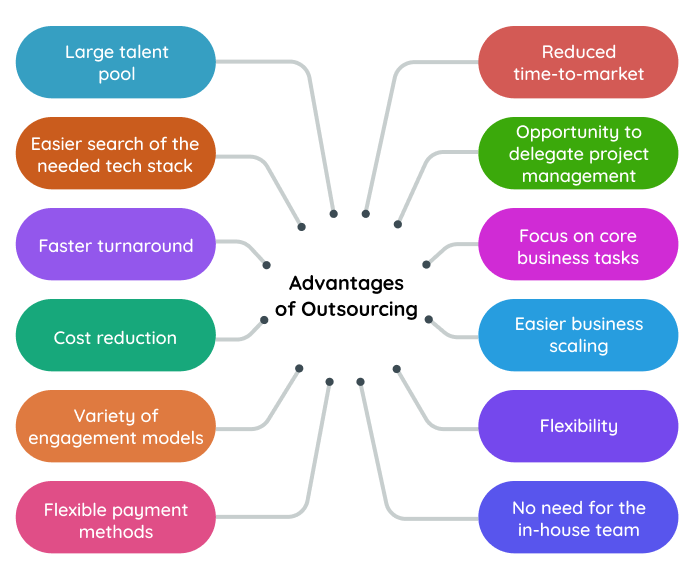10 advantages of outsourcing software development
 Until today,
outsourcing software development has over 70 years of history. In the past 70 years, it has continuously grown year
by year. There are the top 10 advantages of outsourcing software development, and that's why so many companies love
outsourcing
software development.
Until today,
outsourcing software development has over 70 years of history. In the past 70 years, it has continuously grown year
by year. There are the top 10 advantages of outsourcing software development, and that's why so many companies love
outsourcing
software development.
- Expense savings: This can often be more cost-effective than employing an in-house team, as outsourcing firms can leverage economies of scale and access lower-cost talent in other regions.
- Access to a larger talent pool: This can provide access to a broader range of talent, including developers with specialized skills or knowledge working in specific industries or technologies.
- Improved priority on core competencies: Businesses can focus on their core competencies and areas of expertise rather than invest time and resources in in-house software qualifications.
- Shorter time-to-market: Help businesses get their products to market more quickly, as outsourcing firms often have established development processes and can provide additional resources as needed.
- Scalability: A software development outsourcing company provides businesses greater flexibility and scalability, as these outsourcing firms can quickly scale development teams up or down to meet changing project needs.
- Less risk: Outsourcing companies often have established development processes and quality assurance measures. Additionally, outsourcing can provide access to expertise and resources that may only be available in some places.
- Access to 24/7 support: This can provide businesses with support and maintenance services around the clock, which can be especially important for companies with global operations or customers in multiple time zones.
- Enhanced security: It could help businesses improve cybersecurity, as outsourcing firms often have established security practices and protocols.
- Raised innovation: Outsourcing software development can provide businesses access to new ideas, perspectives, and technologies that may not be available in-house.
- Improved quality: Improve the quality of their software products, as outsourcing firms often have established development processes and quality assurance measures.

The future of outsourcing software development
Various factors, including the continued evolution of technology, changes in global economics and politics, and shifting trends in the software development industry, will likely shape the future of outsourcing software development. Here are a few key trends that are likely to shape the future of outsourcing software development:
- Increased use of automation: As automation technologies advance, businesses will likely rely more heavily on these tools to streamline and optimize their software development processes. It may involve using AI-powered tools to automate coding, testing, and other development tasks and robotic process automation (RPA) to automate administrative tasks like invoicing and data entry.
- Greater focus on collaboration: With distributed teams becoming increasingly common in outsourcing software development, there will be a greater emphasis on collaboration and communication tools to help teams work together effectively across different locations and time zones. It may involve the use of virtual reality and augmented reality technologies to create more immersive and engaging collaborative experiences.
- Increased adoption of agile methodologies: Agile development methodologies used in software development. Outsourcing partners that can adapt to these agile methodologies and work collaboratively with their clients will likely be in high demand. However, they are likely to become even more critical as businesses seek to respond more quickly to changing customer needs and market conditions.
- Greater emphasis on security and data privacy: With cyber threats becoming increasingly sophisticated, businesses must emphasize security and data privacy in their outsourcing partnerships. Outsourcing partners that can provide robust security and data protection measures will be highly sought after, particularly in industries like finance, healthcare, and e-commerce.
- Increased use of cloud technologies: Cloud technologies are widely used in software development, but they are likely to become even more critical as businesses seek to improve scalability, flexibility, and cost efficiency. Outsourcing partners that can offer expertise in cloud technologies and help their clients migrate to the cloud will likely be in high demand.
- Rise of low-code and no-code platforms: As software development becomes more democratized and accessible to businesses, low-code and no-code venues will likely become increasingly popular. These platforms enable companies to create software applications without writing code, making it easier and more cost-effective for businesses to develop custom solutions. Outsourcing partners that can offer expertise in these platforms and help their clients build solutions using low-code and no-code tools will likely be in high demand.
- The continued growth of the gig economy: The gig economy, in which workers are hired on a project-by-project basis, is already widely used in outsourcing software development, and it is likely to continue to grow. This trend will enable businesses to tap into a global talent pool of skilled developers, designers, and project managers while providing greater flexibility and cost efficiency.
- Increased demand for niche expertise: As software development becomes increasingly specialized, and there will be a growing demand for outsourcing partners with expertise in specific niches, such as blockchain development, machine learning, or Internet of Things (IoT) development. Businesses offering specialized knowledge in these areas will likely be in high demand, particularly in finance, healthcare, and manufacturing.
- Greater adoption of DevOps: DevOps, which involves integrating development and operations teams to streamline software development processes, is already widely used in software development, but it is likely to become even more critical in the future as businesses seek to improve speed, efficiency, and quality. Outsourcing partners that can provide expertise in DevOps and help their clients adopt these methodologies are likely in high demand.
Shift towards outcome-based partnerships: Finally, as businesses seek to achieve more excellent value and ROI from their outsourcing partnerships, there will be a growing emphasis on outcome-based partnerships. Outsourcing partners that can offer expertise in outcome-based leagues and help their clients achieve their business goals are likely to be highly valued in the future. It involves structuring outsourcing contracts around specific business outcomes, such as increased revenue, reduced costs, or improved customer satisfaction. Leading outsourcing software development companies are already adopting outcome-based models, aligning their success metrics directly with client business objectives to ensure mutual accountability and value creation.
How AI will change outsourcing software development, such as GitHub CodePilot
Artificial intelligence (AI) expect to significantly impact outsourcing software development in the coming years, particularly regarding tools like Github CodePilot. Here are a few ways in which AI hopes to change outsourcing software development:
- Increased automation: As AI technologies continue to improve, they will likely automate routine tasks such as code reviews and testing. It can free up skilled software developers to focus on more complex tasks, improving efficiency and reducing costs.
- Improved accuracy: AI technologies expect to help improve the accuracy of software development tasks such as code reviews and testing. It can reduce errors and improve the quality of the software.
- Greater access to specialized skills: AI tools such as Github CodePilot expects to help software developers access technical skills and expertise they may have yet to access. It can improve the quality of software and increase the speed of development.
- More efficient collaboration: AI technologies will likely improve collaboration between outsourcing partners, allowing teams to work together more efficiently and effectively. It can reduce communication barriers and improve the speed and quality of development.
- Increased innovation: AI technologies expect to help spur innovation in software development, allowing businesses to develop new and innovative products and services. It can help companies to stay ahead of the competition and drive growth.
- Better predictions and insights: AI technologies can also be used to analyze data and make predictions, helping businesses to make more informed decisions about software development. It can reduce the risk of project failure and ensure that outsourcing partnerships are aligned with the business's goals.
- Improved software testing: AI can automate software testing, allowing businesses to test their software more thoroughly and efficiently. It can improve software quality and reduce the risk of bugs and errors.
- More personalized software: AI technologies can personalize software based on user preferences and behavior. It can help improve user satisfaction and engagement and help businesses stay ahead of the competition by providing a more tailored user experience.
- Enhanced security: AI technologies can improve cybersecurity, helping identify and respond to potential security threats. It can help businesses protect their sensitive data and ensure their software is secure and reliable.
- New business models: AI technologies are expected to create new business models in outsourcing software development. For example, businesses may use AI-powered tools to develop software more quickly and efficiently, or they may be able to offer specialized AI services to their clients.
Github CodePilot is an excellent example of how AI is already used to improve outsourcing software development. CodePilot is an AI-powered tool that suggests code snippets to software developers as they write code, helping to speed up development and reduce errors. Using AI to automate routine coding tasks, CodePilot can help free up skilled software developers to focus on more complex tasks and improve the software development quality.
In conclusion, AI expects to significantly impact outsourcing software development in the coming years, improving efficiency, accuracy, collaboration, and innovation. Tools such as Github CodePilot are already providing a glimpse of what's possible, and businesses that can harness the power of AI in their outsourcing partnerships are likely to enjoy a range of benefits.